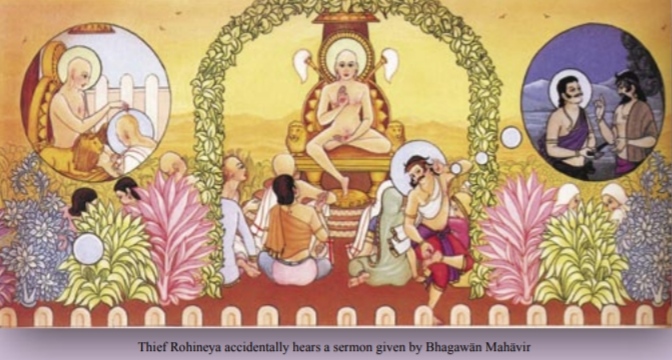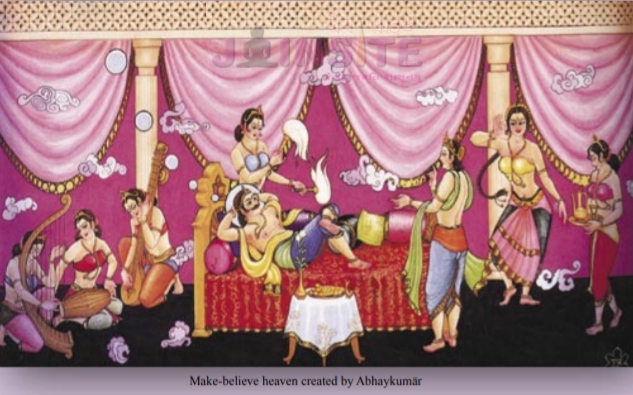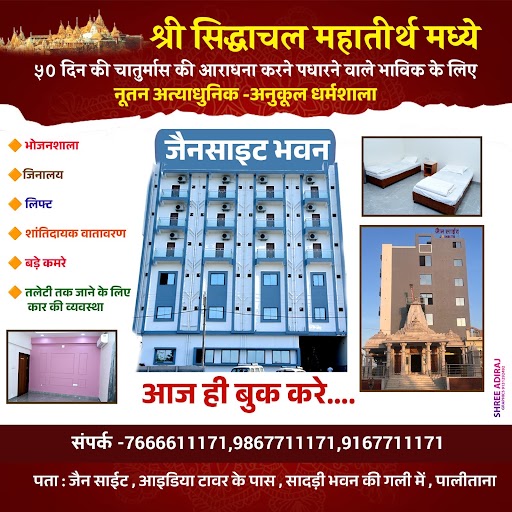Abhaykumär and Thief Rohineya
During the time of Lord Mahävir there was a burglar named Lohkhur. He lived in a remote cave in the Vaibhärgiri hill near the city of Räjgrihi. He was very clever in his profession and never left any traces of his burglary. He and his wife, Rohini, had a son named Rohineya. As Rohineya grew up, he learned his father’s profession and eventually became an expert burglar. He even surpassed his father in intelligence and smartness. It was almost impossible to recognize him when he was in disguise. If someone pursued him, he could outrun him or her. He robbed the rich and hid the treasures in the most unexpected and inaccessible places. He extended help to the poor from the wealth that he accumulated. Many of them felt grateful and were pleased with him. Therefore, they were not willing to help government officials to track him down.
Lohkhur was now very old and could see that his life was coming to an end. When he was on his deathbed, he called Rohineya and said that he was very happy with the expertise that he had shown in committing burglary, their ancestral profession. In order to remain successful, he advised his son never to listen to the sermons of Lord Mahävir because his teachings were not conducive to their profession. Rohineya promised his father he would abide by his advice.
After Lohkhur died, Rohineya expanded his burglary so much that it became almost impossible for rich
families to ensure the safety of their property when they went out. They were constantly afraid that Rohineya would go to their home during their absence and take the jewelry and other valuables. Some people went to King Shrenik and requested him to take action to protect them from Rohineya’s burglaries, since police officers had failed to do anything about the matter. The king therefore asked his most intelligent chief minister Abhaykumär to take charge of arresting Rohineya.
Once, while Rohineya was secretly on his way to Räjgrihi, he had to pass by the side of the Lord Mahävir’s assembly hall. He remembered his father’s advice not to ever listen to Lord Mahävir’s sermon. He put his hands over his ears. Unfortunately, at that moment he stepped on a sharp thorn that went deep into his foot. He had to take his hands off his ears in order to take out the thorn. During this time, he heard the following words:
‘Human life is the best of all lives. It is possible to attain liberation only as a human. Every human being can attain salvation irrespective of caste, creed, or color. By virtuous deeds, one can gain a life in heaven where all sorts of pleasures and happiness exists.’
When heavenly beings walk their feet do not touch the ground. Their bodies are without shadow, their eyes remain steady, and their garlands do not wither. However, the life of a heavenly being does not lead
to ultimate liberation, which provides eternal bliss and happiness. Therefore, heavenly beings crave a human life.’
By that time Rohineya had removed the thorn from his foot and covering his ears again with his hands, he proceeded towards the city.

accidentally hears a sermon given by Bhagawän Mahävir
In the city, Abhaykumär had secretly posted trained soldiers in disguise at the gates and at all important locations. He himself remained watchful. When Rohineya entered the city, a trained soldier recognized him even though he was in the disguise of a farmer. The soldier sent a message to Abhaykumär that an unidentified person had entered the city. Abhaykumär became very alert. As Rohineya passed by, Abhaykumär glanced at him from a secret place. He recognized the burglar even in disguise and instructed his men to surround him. Smart as Rohineya was, he quickly recognized the danger. He ran towards the city wall. Unfortunately for him, there were soldiers near the wall. He was thus easily apprehended and was put in jail.
The next day he was presented in the royal court. As Rohineya was in disguise, it was hard to identify him as the burglar. Abhaykumär was of course sure but how could the accused be punished without proof of his identity? When the king asked him about his identity, Rohineya replied that he was a farmer named Durgachandra and belonged to the Shäligräm village. He had come to Räjgrihi to visit the capital and was returning home when the watchmen apprehended him. Rohineya had made arrangements for that assumed identity with the residents of the village. When inquiries were made in that village, the people confirmed what Rohineya had stated in court.
Abhaykumär had to devise a plan for getting a confession from Rohineya regarding the burglaries. He came to know that Rohineya was fond of drinks. He therefore arranged to serve an excessive amount of wine to the thief. The excessive wine made him unconscious. While unconscious, Rohineya was cleaned, dressed in extravagantly perfumed royal garments, and adorned with valuable jewelry. He was then placed on a luxurious velvet bed of sandalwood on the top floor of a palatial building. As Rohineya regained his consciousness, he saw himself in heavenly surroundings. There was a breathtaking view all around: the walls, ceiling and floor were crystalline, beautiful maidens were waving scented air with diamond studded fans, soft serene music was heard in the background, and fairylike dancers were dancing in tune with the music, and divine musicians were getting ready for a musical concert.
Rohineya could not make out where he was. He asked one of the girls where he was and why all of them were serving him so well. The girl replied that he was their new king in heaven. He had attained all the divine comforts, which now belonged to him. He could live like Indra, the king of heaven, and enjoy
life with heavenly damsels.‘Could this be true for a burglar like me?’ he asked himself. However, he then remembered that he was helpful to the poor and needy, and he was sure that God had been just. ‘Or could this be the plan of Abhaykumär?’ he thought again. It was hard for him to decide what the truth really was. He therefore thought it was best to wait and see.

Make-believe heaven created by Abhaykumär


